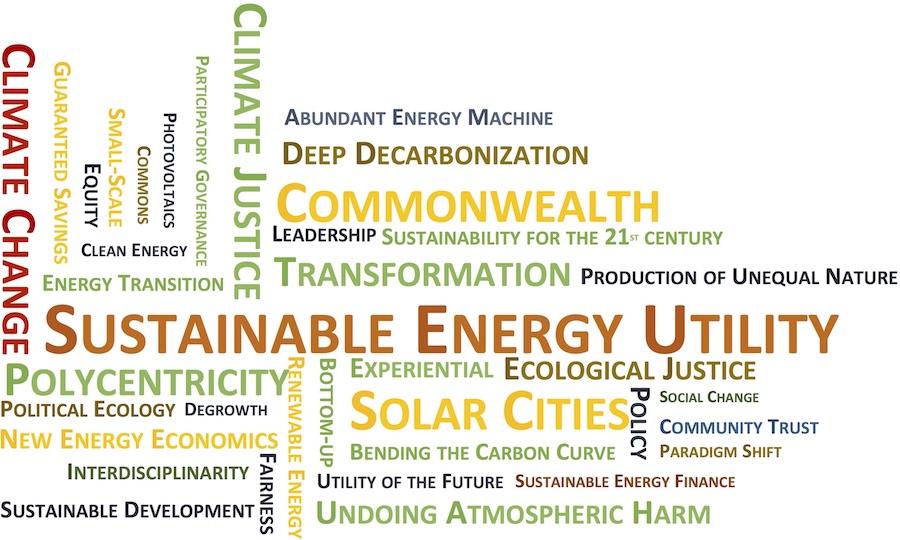
Phronesis (φρόνησις)
Full Cite:
The optimality paradigm that guided 20th century energy development led to rapid growth in mostly fossil-fuel based energy production and a similar rise in energy intensive consumption. The paradigm succeeded in growing global income and wealth at rates unmatched in human history. But it also created an energy obese social condition with unacceptable social, climate, and other risks. Left to its own devices, the paradigm could only repair social and ecological harms at a pace consistent with economic growth. As the problem of climate change has made clear, however, this pace is far too slow to sustain a healthy future in human and ecological terms.
Sustainability as a principle of commons development repositions the social dynamic away from singularizing individual gain and, instead, reconstitutes society as a matrix of community landscapes confronting the practical consequences of energy-environment-development interactions. The SEU appears to offer a promising practical strategy to deploy sustainability as an operational form of commonwealth economics. SEUs can continuously organize investments creating significant potential for the model to substantially change the energy economy. At the same time, an SEU keeps value in the local context due to its bottom-up, polycentric governance and economic structure, thereby linking its viability to ongoing community trust.
Business-as-usual scenarios clarify the untenable character of the 20th century’s Great Acceleration as we move forward in the 21st century: when no action is taken, society will continue to push the limits and strain environmental boundaries. The range of concerns that modern society faces go well beyond the singular issue of energy, but abundant energy machines are now a major part of the problem instead of a solution. The SEU model offers an opportunity to tackle modern dilemmas which have emerged from 20th century conventional utility performance. Building community trust and commonwealth economies, an SEU model may represent a Social Change 2.0 method to deliver transformation, rather than relying on incremental change of supply-side business-as-usual development to meet our dual challenge of social and ecological progress.
Full Cite:
… the new policy context of energy productivity conservation and renewable energy represents a paradigm shift from the “more is better” principle toward a foundation built on enjoying less. Such a paradigm shift fundamentally re-arranges the energy–environment–society relationship as the policy frame-work concentrates on efforts to fulfill human needs and wants.
Full cite:
From climate change to acid rain, contaminated landscapes, mercury pollution, and biodiversity loss, the origins of many of our least tractable environmental problems can be traced to the operations of the modern energy system. A scan of nightfall across the planet reveals a social dilemma that also accompanies this system’s operations: invented over a century ago, electric light remains an experience only for the socially privileged. Two billion human beings—almost one-third of the planet’s population—experience evening light by candle, oil lamp, or open fire, reminding us that energy modernization has left intact—and sometimes exacerbated—social inequalities that its architects promised would be banished. And there is the disturbing link between modern energy and war. Whether as a mineral whose control is fought over by the powerful [..], or as the enablement of an atomic war of extinction, modern energy makes modern life possible and threatens its future.
Full Cite:
A contrast exists between decisions guided by capital and technology to endanger the health of workers and whole communities by pollution practices at various industrial sites (which enhance profit, market position, etc.) and the collected practices of technological societies which in toto valorize a particular atmospheric chemistry (specifically, one richer in CO2). The difference is fundamental. In the former case, a social structure—technological society—guides behaviors which adversely impact nature at the behavioral level: air, water, and human tissue are poisoned to some degree. But the natural order, which produces air, water, and living matter, is not itself altered; the effect of the pollution is too small to restructure nature; and the force of technolization and capitalization are too specific in their goals to alter natural order. In the latter, social structure threatens to cause a different natural order to evolve. This interpretation conceives commodification as having breached the nature-society duality and is now encroaching on the structural organization of nature itself. This prospect lies beyond the theoretically possible for social and physical analysis as presently organized. Apparently, however, it is not outside the reality of contemporary nature-society relations.
Full Cite: